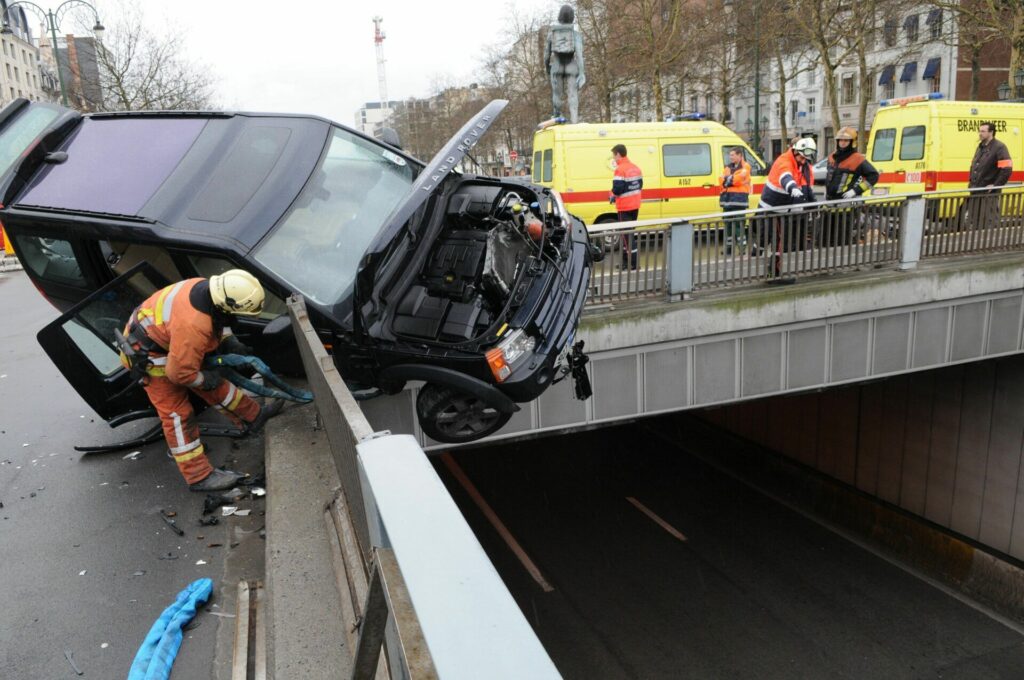Despite new measures being implemented to improve traffic safety in the region, the number of traffic accident victims in Brussels reached its highest level last year since records began.
The safety of pedestrians, car drivers and passengers has improved slightly in the capital, in part due to stricter speed limits with the expansion of 30 km/h zones across the region. But the rising use of e-scooters and bicycles in the capital region is having a negative impact on the trend, the latest Mobility and Road Safety Monitor by Bruxelles Mobilité showed.
"There have also been worrying developments such as a trend towards larger and heavier car models, using smartphones behind the wheel, and an increasing number of drivers under the influence of alcohol and drugs," the organisation noted.
Consequently, 4,800 people were injured in traffic accidents in Brussels last year – the highest number since records began 13 years ago and an increase of 5.3% since 2019 when the last comparable data was recorded.
Return to normal
As expected, the number of injured pedestrians dropped in 2020 and 2021 as a result of the pandemic and more people staying indoors.
However, even in 2022, 913 pedestrians were injured – down from 1,064 in 2019. This highlights a downward trend in the contrast with the usual average, which fluctuates around 1,100 annually.
"Despite traffic returning to normal levels, last year was much safer for pedestrians than the pre-pandemic period. It is always difficult to deduce real cause-and-effect relationships, but the introduction of the 30 km/h zones can only have had a positive impact in this respect," Bruxelles Mobilité noted.

A traffic sign announces a new section control speed camera system in a 30 km/h zone. Credit: Belga / Nicolas Maeterlinck
For the same reasons, a similar trend was recorded among those in cars: the number of injured people was the lowest in a decade, dropping from 1,844 in 2012 to 1,115 in 2022.
"In a city where the speed limit is 30 km/h, it is very unlikely that a car occupant will be injured, because the speed is lower and the seatbelt can play its full protective role." However, this does not prevent cars from being the main cause of injury to other road users.
Mixed picture for cyclists
The figures are worse for cyclists, who sustained more injuries (1,086) in 2022 than ever before. This number has continued to rise steadily year on year since 2010, amounting to an almost 170% growth in the number of injured people after 12 years.
This is most likely the result of a sharp increase in the number of cyclists (300% growth since 2010), which statistically leads to an increase in the number of people injured. "The fact that the increase in accidents is slower than the increase in use shows that the relative risk of having an accident is falling," Bruxelles Mobilité noted.
It did note that the necessary adjustments to infrastructure should be made, as the falling trend "must continue towards the goal of zero deaths and serious injuries," which the region aims to reach by 2030.
These latest figures have highlighted that the region, for now, seems to be moving in the wrong direction. "In 2022, the number of fatalities and serious injuries was remarkably high: 21 fatalities and 205 serious injuries, many more than in the last few years," said Bruxelles Mobilité.
Related News
- Number of blind spot accidents up 35% last year
- Too big and antisocial: Brussels looks into anti-SUV measures
A decline was also recorded among pedestrians, and an increase linked to the growth in the number of users of two-wheeled vehicles. Bruxelles Mobilité stressed that 75% of accidents in which car occupants are seriously injured or killed take place in areas where the speed limit is 50 km/h or more, "where the effect of the 30 km/h zones does not have a sufficient influence."
"The progress made in these zones must now be continued by making the roads safer where the speed limit is 50 km/h or more and where serious accidents have occurred," the organisation concluded.


